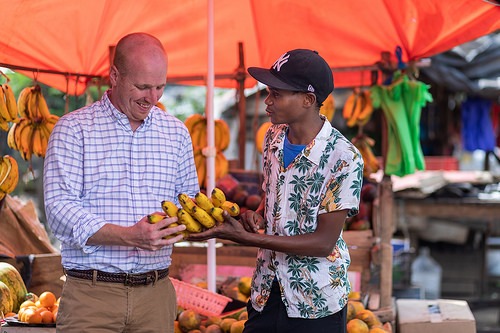 Twiga Foods, a business-to-business logistics platform for kiosks and food stalls in Africa has partnered with IBM on a blockchain-enabled finance lending platform to expand its logistic services into a total market ecosystem by adding financial services for its clients.
Twiga Foods, a business-to-business logistics platform for kiosks and food stalls in Africa has partnered with IBM on a blockchain-enabled finance lending platform to expand its logistic services into a total market ecosystem by adding financial services for its clients.
Grant Brooke, co-founder of the $13 million startup explains, “Previously, we were focused on helping farmers distribute bananas, tomatoes, onions and potatoes to 2,600 kiosks across Kenya, but we soon realized that we could help them sell even more produce with access to working capital. It’s simple, if the food vendors can sell more, we can distribute more, growing both of our businesses.”
They used machine learning and mobile data to develop vendors’ credit scores.
To test the new platform Twiga Foods and IBM ran a pilot at the end of last year with 220 small food kiosks, known locally as “mama mbogas” in Swahili, across Kenya
“We analyzed purchase records from a mobile device and then apply machine learning algorithms to predict credit worthiness, in turn giving lenders the confidence they need to provide microloans to small businesses. Once the credit score is determined, we used a blockchain, based on the Hyperledger Fabric, to manage the entire lending process from application to receiving offers to accepting the terms to repayment,” said Isaac Markus, a researcher on the inclusive financial services group at IBM Research in Kenya.
Smart contracts
With blockchain, the lending process becomes transparent to all permissioned parties involved, from the lending bank to the borrower’s bank and the loan applicant themselves. Blockchains are immutable, helping to reduce fraud, since no one single party can append the blockchain without consensus from the entire network. Finally, blockchains employ a series of “smart contracts” which can be executed in real time, having the potential to significantly reduce the time it takes to manually process and issue a loan.
According to a press release, to test the new platform Twiga Foods and IBM ran a pilot at the end of last year with 220 small food kiosks, known locally as “mama mbogas” in Swahili, across Kenya.
The eight-week pilot processed more than 220 loans with the average loan around $30 (3,020 KES), which increased the order size by 30 percent and profits for each retailer, on average, by six percent. The loans were for four and eight days with an interest rate of one and two percent, respectively.
- See also: How the Jobs Fund Works
All of the loans were executed via mobile phone and went directly toward working capital for the businesses. When a retailer had an order delivered, they would get an SMS with loan options for financing that order. They would then respond to the SMS confirming the loan option they preferred.
“We had several iterations of the platform based on feedback from the retailers. The SMS-based solution provided an effective channel for a diverse set of users, some with limited IT literacy, to access financing for their orders,” said Andrew Kinai, the lead software engineer on the project at IBM Research.
Based on the success of the pilot, the plan is for the platform to be rolled out to more SMEs across Africa by the end of the year and expanded into new sectors.


